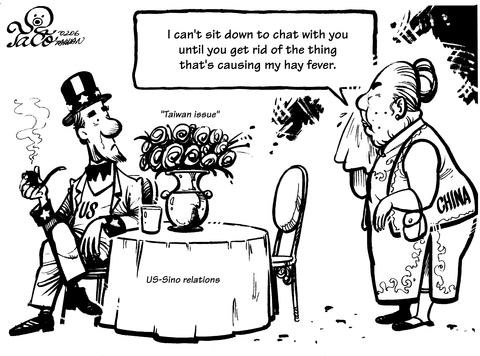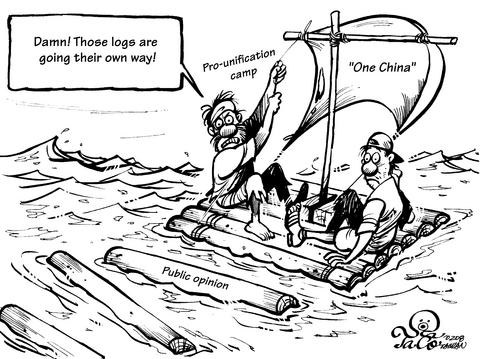 Taiwan
Communiqué No. 102, September 2002
Taiwan
Communiqué No. 102, September 2002 Taiwan
Communiqué No. 102, September 2002
Taiwan
Communiqué No. 102, September 2002During the past few months, US policy towards Taiwan had its ups and downs. Overall, the Bush Administration's line has been rather straightforward and clear following Mr. Bush's April 2001 statement that he would do "whatever it takes" to help defend Taiwan (see The demise of "strategic ambiguity" in Taiwan Communiqué no. 101).
Still, on occasion Administration officials slide back into the direction of Mr. Clinton's despicable "Three No's" or other anachronistic Kissinger-speak, while on other occasions they break new ground in the positive direction.

A case in point of a negative slide is Deputy Defense Secretary Paul Wolfowitz, who had earlier been a strong advocate of "whatever it takes" and in March 2002 had give valuable advice to Taiwan to streamline its military and upgrade its capabilities to defend itself.
On 15 May 2002 at a speech to the National Press Club in DC, Mr. Wolfowitz stated that "…there is no intention, no desire to separate Taiwan from the mainland or have an independent Taiwan." When asked for a clarification, Mr. Wolfowitz let himself be gauded by some pro-unificationist reporters into saying that this was another way of stating that "we're opposed to Taiwan independence."
He reiterated this at the end of May 2002 at a briefing to reporters in preparation to his attendance at a Singapore security meeting, saying that the US was "opposed to Taiwan independence." Of course he also reiterated the US position that there should be a peaceful resolution.
Taiwan Communiqué comment: Traditionally, the US has emphasized that it supports a peaceful resolution of the conflict between China and Taiwan, and has thus only pronounced itself on the process, and not on the final outcome of this process. Mr. Clinton's "Three no" mistake in 1998 _ now reiterated by Mr. Wolfowitz in May 2002 — was that he pronounced himself on one possible final outcome in a negative manner, and thus displayed a bias towards Beijing.
If the US wants to remain totally neutral on the final outcome, and if it doesn't want to expressly support independence, it should, in one breath, also state that it doesn't support unification either. Otherwise it should remain totally mum on both points.
Still, to Taiwanese committed to freedom and democracy, it looks rather peculiar that the country that calls itself the leader of the free world wouldn't support us as a free, democratic and independent nation, and still kowtows to China's communist rulers in Beijing.
A positive statement coming out of Washington during this past summer was Secretary of State Colin Powell's mention of Taiwan as a "success story." On 10 June 2002, in a major speech on US East Asia policy to the Asia Society Annual Dinner, Mr. Powell said:
"…we continue to insist that the mainland solve its differences with Taiwan peacefully. Indeed a peaceful resolution is the foundation on which the breakthrough Sino-American communiques were built, and the United States takes our responsibilities under the Taiwan Relations Act very, very seriously.
People tend to refer to Taiwan as "The Taiwan Problem". I call Taiwan not a problem, but a success story. Taiwan has become a resilient economy, a vibrant democracy and a generous contributor to the international community."
A third important clarification on US policy towards Taiwan was made by Deputy Secretary of State for East Asia Mr. Richard Armitage at a press conference on 26 August 2002 in Beijing:
Question: You just mentioned that the administration doesn't support Taiwan independence. Can you explain why the administration is taking a position on the final outcome in the Taiwan Strait? And, what could happen if the people on both sides of the Strait decided that Taiwan could go independent? Would Washington continue not to support Taiwan independence? Could you flesh out this policy a little more, so we'd understand it more?
Mr. Armitage: The wording is important. By saying we do not support, it's one thing. It's different from saying we oppose it. If people on both sides of the Strait came to an agreeable solution, then the United States obviously wouldn't inject ourselves. Hence, we use the term we don't "support" it. But it's something to be resolved by the people on both sides of the question.
This editorial first appeared in the Taipei Times on 28 August 2002. Reprinted with permission.

US Deputy Secretary of State Richard L. Armitage's statement regarding
Washington's policy on "Taiwan independence" during a press
conference at the US embassy in Beijing on Monday was the topic of intense
discussion yesterday. "I think the wording is important. By saying we
do not support it is one thing. It's different from saying that we oppose
it," Armitage was quoted as saying in wire agency reports. The debate
over his comments highlights the sensitive nature of the trilateral
relationship between the
US, China and Taiwan.
The distinctions between "no support" and "opposition" can hardly be described as fine-lined. According to the Random House Webster's Unabridged Dictionary , to "support" is "to maintain ... by supplying things necessary to existence," while to "oppose" is "to act against or provide resistance to." So one obvious inference to draw from Armitage's remarks is that the US will not actively aid Taiwan in the event that the latter opts for independence. That, of course, is very different from acting to oppose the cause.
As a country founded on democratic values, the US can't possibly go out of its way to stop the people of Taiwan from exercising their right to self-determination. The question then becomes whether declining to support or help an exercise of that same right is any less morally culpable. That question of course has no simple answer.
While it is understandable why Washington opts for ambiguity and word games about Beijing's "one China" principle, the people of Taiwan deserve a straight answer. If Taiwan independence is the watershed that will change everything for both the US and China, then both countries must define exactly what they would consider independence. Otherwise, the people of Taiwan risk stepping over the line unknowingly.
Is Taiwan independence a reality only when the name of this country is changed to the Republic of Taiwan? Or does it refer to substantive state sovereignty on this side of the Taiwan Strait, irrespective of what it is called? If it is the latter case, Taiwan is already guilty.
Vice President Annette Lu made some rather keen observations about Armitage's comments, saying that if "Taiwan independence" requires further "work" the US will not take part — but, if it is already the status quo, then the US will of course not oppose it.
If this is the case, then of course it is very good news for Taiwan, since most people will probably agree that latter is already the case. But the question remains whether China accepts such a scenario?
In any event, while Armitage's remarks did not depart from the bounds of existing US-Taiwan policy, it should nevertheless still be interpreted as a friendly gesture toward Taipei. After all, it wasn't too long ago that US Deputy Secretary of Defense Paul Wolfowitz indicated during a press conference that the US "opposes Taiwan independence." Wolfowitz's statement marked the only occasion since the signing of the 1972 Shanghai Communiqué in which a high-ranking US official openly expressed Washington's opposition to Taiwan independence.
Armitage's clarification of the US position should not be equated with opposition to "Taiwan independence." His remark also toned down the immediate reaction in Washington to President Chen Shui-bian's "one country on each side [of Taiwan Strait]" — which was that the US does not support Taiwan independence.
Mr. Li Thian-hok is a prominent member of the Taiwanese-American community. This article first appeared in the Taipei Times on 30 June 2002. Reprinted with permission.
"If Taiwan chooses unification, should the United States care?" is the title of a recent paper in The Washington Quarterly by Nancy B. Tucker, professor of history at Georgetown University. Tucker notes that while the vast majority of Taiwanese people prefer an open-ended status quo, the growing tide of Taiwanese investment in China makes Taiwan's prosperity dependent on the political relationship with Beijing.
The Chen Shui-bian administration's policy of "active opening" has resulted in an outflow of capital and jobs to China. Entry into the WTO promises to intensify the pressure to expedite the direct transportation, communication and trade links with China and unification on Beijing's terms.
Beijing uses both a seductive strategy (tax incentives to Taiwan's businesspeople and promises of political power in a greater China to the those who are politically ambitious, or a united front, to court the PFP and KMT) and a coercive strategy (an accelerated missile buildup to force Taiwan to surrender before the US can intervene).
If the democratically elected Taiwanese government chooses peaceful unification with China, the US will be in no position to object. So, it is time for Washington to consider the implications of such a move. In that regard, Tucker lists several adverse strategic consequences for the US. China's naval and air power will be projected beyond coastal waters. China will be able to interrupt vital sea lanes in the vicinity of Taiwan and strangle Japan's economy.
An apprehensive Japan could thus revise its constitution, expand its military and preserve its US alliance. The US would have to surrender its listening posts in Taiwan. To prevent military technology from falling into China's hands, some members of Congress have called for ending sales of sophisticated US arms to Taiwan or disabling weapons already sold.
Taiwan as part of China could strengthen a China whose values had not changed. Despite these adverse consequences, Tucker concludes that avoiding war with China is in the US' best interest.
While many policymakers in Washington have been increasingly concerned that President Chen's policy of economic and political integration may eventually lead to a bloodless surrender of Taiwan's sovereignty and democracy, Tucker is perhaps the first Sinologist to publicly address the issue.
While Tucker's topic is timely, I do not agree with her views in two areas. First, mainstream Japanese public opinion is against rearmament. The anti-war sentiment is deeply ingrained into the Japanese psyche due to the horrendous casualties of World War II and the trauma of the Hiroshima bomb.
With Taiwan's fall, Japan might conclude that America is not a reliable ally and opt to become a docile protectorate of China, offering Japan's financial and technological resources as tributes in return for China's promise of non-aggression. After all, Taiwan's dire straits are due in part to years of neglect by the administration of former US president Bill Clinton. Once Japan sides with China, the US will have little choice but to withdraw from East Asia.
Second, peace with China may merely defer a greater conflict. With the combined resources of this greater China, the Koreas and Japan, Beijing could challenge America's military, political and economic supremacy within two decades, threatening the US with a nuclear Pearl Harbor.
It is not wise to take a sanguine view of Taiwan's absorption by the People's Republic of China.
Back to: Table of Contents
Copyright © 2002 Taiwan Communiqué